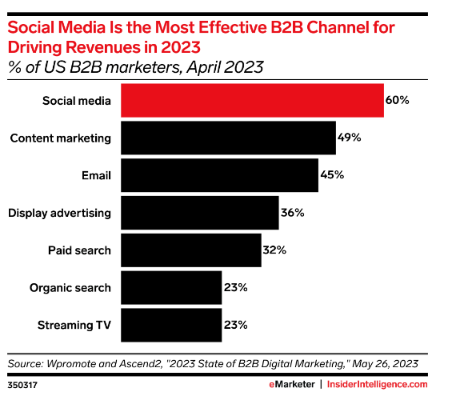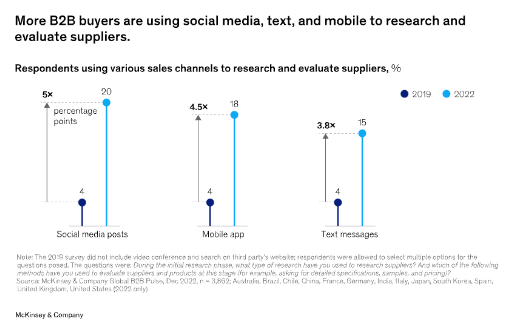From MySpace to Meta, social media has been through more evolutions than a deck of Pokémon. Today’s platforms offer a multimedia-rich ecosystem, ultimately shaping modern digital culture and commerce.
Customer behavior has grown in tandem with these platforms as users vote with their views and clicks. People around the world spend an average of nearly 2.5 hours a day on social media, making it the most effective global marketplace for brands who want to offer their customers a more personalized and interactive experience.
B2B marketers who wish to optimize their social media spend should first invest in understanding the intrinsic link between these platforms and their users. First, let’s take a look at where B2B social media marketing stands today.
The state of B2B social media marketing
2023 saw a 20% increase in social media marketing investment by B2B marketers. And even as paid content distribution decreased overall (a drop of 14% from 2022 to 2023), the vast majority (85%) of those dollars went toward paid social media.
Perhaps the most compelling statistic we’ve found is from Insider Intelligence, which shows that 60% of B2B marketers named social media as the most effective channel for driving revenue.

And businesses aren’t just using social media to market their products and services. McKinsey has identified four primary ways in which brands use social media: monitoring, responding, amplifying, and influencing customer behavior.
That final point, influencing customer behavior, underscores the importance of social media in B2B marketing.
Understanding B2B customer behavior
Understanding your customers as individuals is crucial for building out an effective B2B social media marketing strategy. Modern buyers crave more than just a transaction; they seek a seamless, personalized experience. This involves:
- Multiple channels: Today’s B2B buyers are not just sticking to email or direct sales. They engage with brands through webinars, social media, and even chatbots.
- Convenience: Time is money. Features like one-click reordering, quick customer support, and easily navigable platforms can make or break a deal.
- Personalization: Customization is key. From tailored email marketing to curated product suggestions, giving buyers what they specifically need keeps your brand top of mind.
How social media can influence customer behavior
Influencing buyer behavior hinges on crafting a well-rounded strategy that integrates content and engagement. Your content should be informative, insightful, and relevant to the pain points and needs of your target buyers. It serves as the foundation upon which you establish yourself as a trusted resource and thought leader in your industry.
But content alone is not enough. Engagement is essential to gaining mindshare and building relationships with your audience. This involves actively listening to them, responding to their questions, and participating in conversations. It’s how you humanize your brand, making it relatable and approachable.
Customers reward an omnichannel strategy
Data increasingly supports the adoption of omnichannel strategies in B2B. This doesn’t mean just being present on multiple platforms, but integrating them for a unified customer experience.
A recent study by McKinsey found that “B2B companies that provide the best omnichannel experience are improving their market share by at least 10 percent annually.” It’s a clear indicator that adapting to modern buyer behavior is not just a good idea; it’s essential for sustained success.
Social media: A key touchpoint in B2B marketing
Online communities offer more than just a platform for ad placement. They enable opportunities to connect with your customers through sharing thought leadership and other compelling content, which in turn drive highly targeted traffic back to your website.
The benefits don’t stop at content distribution. These platforms are where people go to talk, offering a wealth of insights into your target audience’s needs, challenges, and interests. Actively participating in these conversations not only enhances your brand’s credibility but also serves as a rich source of market intelligence.
Your audience sees social media as a great source of intelligence as well. McKinsey has found that B2B buyers lean heavily on social media as a source of brand and product information.

What’s next for B2B social media marketing
The future of B2B marketing is increasingly intertwined with strategic investments in social media. With advances in data analytics tools, the ability to pinpoint the ROI of social media efforts has never been more accurate. Social media is no longer a “nice to have” component of your overall B2B strategy. It’s vital to ensure that your social media efforts align with and amplify other elements of your marketing mix.
Looking ahead, several trends are poised to shape B2B social media marketing. Video content, particularly live-streaming, will continue to gain traction. Expect to see more companies leveraging live video for Q&A sessions, product launches, and webinars. AI and automation will play a more significant role as well, offering advanced levels of personalization and customer journey mapping.
In short, the future holds ample opportunities for those willing to adapt and innovate in their social media strategies. Being proactive, rather than reactive, will help you gain that competitive edge.
Learn more about how TopRank Marketing can help you develop a B2B social media marketing strategy that grows your business.



